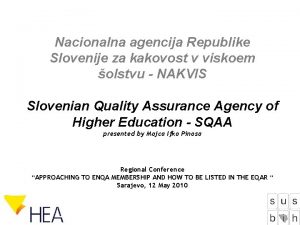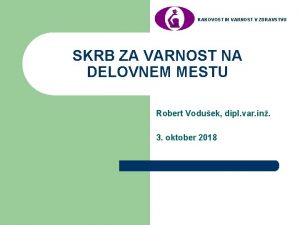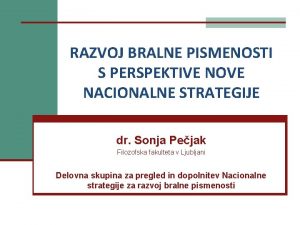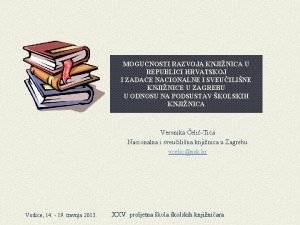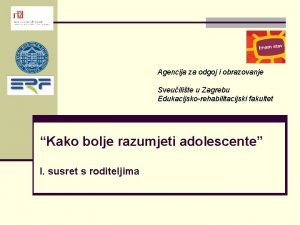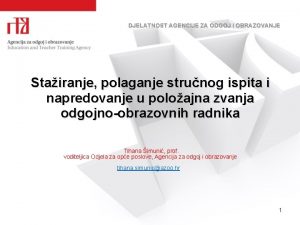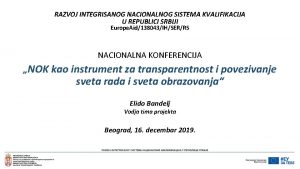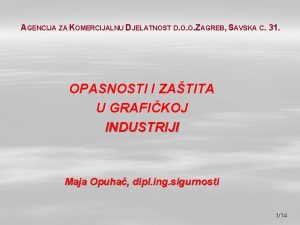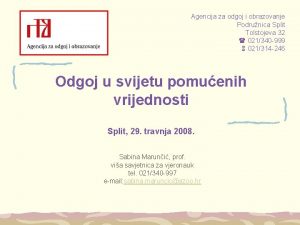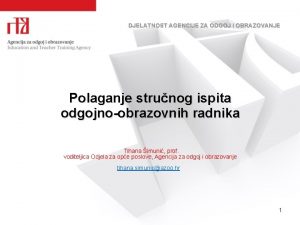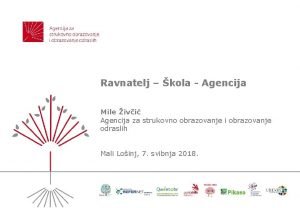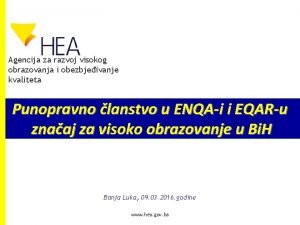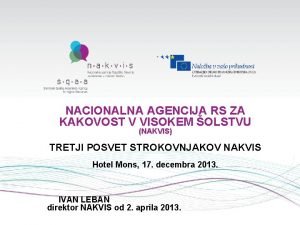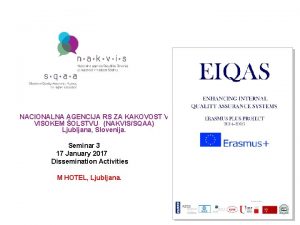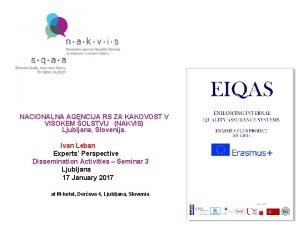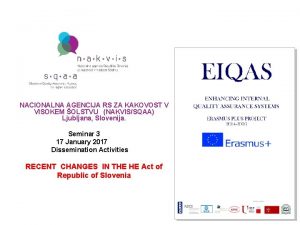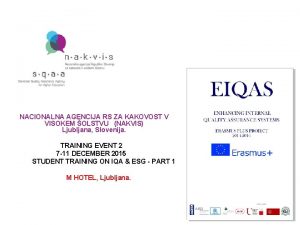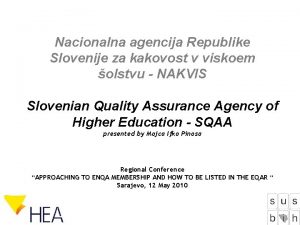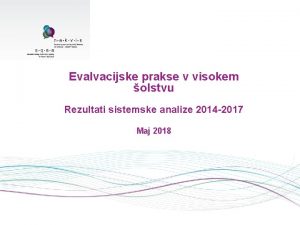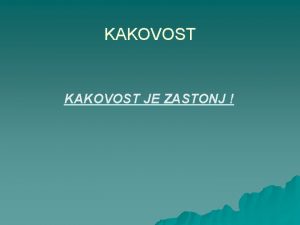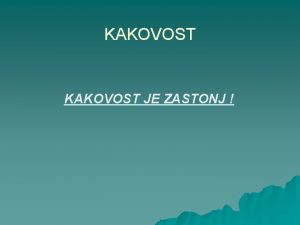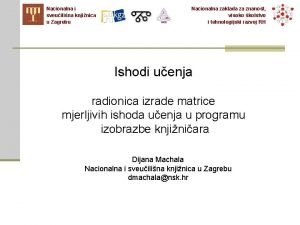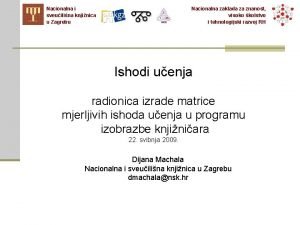NACIONALNA AGENCIJA RS ZA KAKOVOST V VISOKEM OLSTVU

















- Slides: 17

NACIONALNA AGENCIJA RS ZA KAKOVOST V VISOKEM ŠOLSTVU (NAKVIS) Ljubljana, Slovenija. Ivan Leban D. Phil (York) Experts’ Perspective Dissemination Activities – Seminar 4 Warsaw, Poland 9 February 2017 at HOTEL NOVOTEL CENTRUM, Warsaw.

Question: Am I an expert to give you Experts’ Perspective as Member of experts’ pool EUA IEP (2006 Vice-chair of CEENQA (2013 Vice-chair of ECA (2014 Vice Rector UL (2001 -2005) Institutional evaluation of universities (in different systems): Turkey Izmir(2), Aydin, Bolu, Ankara Romania Suceava, Iasi, Galaty Montenegro Podgorica Croatia Zagreb, Split Lithuania Kaunas Latvia Riga Portugal Porto Kazahstan Almaty Macedonia Skopje Bulgaria Sofia Russia Samara Slovenija UP ( I am not an expert, I have not had any training, just I have a lot of experience)

But I was a speaker also in Lublin 12 yrs ago, Poland in March 2004 Państwa, które w sobotę znajdą się w Unii Europejskiej, widzą w integracji swoją wielką szansę, ale nie brakuje też obaw i wątpliwości. Najdobitniej wyraził je wczoraj prof. Ivan Leban wicerektor uniwersytetu w Lublanie na Słowenii, uczestnik dyskusji w drugim dniu obrad kongresu rektorów. Apelował, by zmiany związane z procesem bolońskim polegającym na integracji systemów edukacyjnych przeprowadzać ewolucyjnie. Skrytykował kapitalizm akademicki, wedle którego uniwersytet powinien podlegać prawom podaży i popytu. Zdaniem profesora grozi to likwidacją nieopłacalnych kierunków humanistycznych, jak np. historii. – Deklaracja Bolońska to w znacznym stopniu dokument polityczny w wielu punktach rozbieżny z uchwaloną 11 lat przed nią Wielką Kartą Uniwersytecką akcentujący różnorodność i fundamentalne zasady określające oblicze uczelni – powiedział rektor z Lublany. Tekst ukazał się w Kurierze Lubelskim

Now I am in QUALITY ! But WHAT IS QUALITY ? THE QUALITY MEANS DOING IT RIGHT WHEN NO ONE IS LOOKING. H. FORD THE PURPOSE OF EVALUATION IS TO IMPROVE, NOT TO PROVE. QUALITY PAYS. And QUALITY HAS A LOT IN COMMON WITH INTEGRITY There are European Standards and Guidelines ESG (2005, Bergen) Revised ESG standards (Erevan, May 2015) For the implementation of Bologna lines – BFUG – Stocktaking Next Meeting in Paris in 2018

My view on Quality in HE ? My definition of QUALITY in HE – you should have: -Motivated students -Dedicated and Trained Teaching Staff -Good Infrastructure -To achieve Excellence in Teaching and in Research -Sustainable Financing -Proper Service to Society A lot of terms of Quality were taken from Business World: Mission Vision Quality Culture PDCA cycle SWOT analysis

ØA PEER-REVIEW APPROACH Ø IMPROVEMENT ORIENTED QUALITY CYCLE

ESG 2015 THE STANDARDS FOR QUALITY ASSURANCE HAVE BEEN DIVIDED INTO THREE PARTS , BUT ARE HEAVILY INTERLINKED: -- INTERNAL QUALITY ASSURANCE Part 1 -- EXTERNAL QUALITY ASSURANCE Part 2 -- QUALITY ASSURANCE AGENCIES Part 3 BUT WHAT IS IMPORTANT ? The ESG are not standards for quality, nor do they prescribe how the quality assurance processes are implemented, but they provide guidance, covering the areas which are vital for successful quality provision and learning environments in higher education. The ESG should be considered in a broader context that also includes qualifications frameworks, ECTS and diploma supplement that also contribute to promoting the transparency and mutual trust in higher education in the EHEA.

ESG ARE BASED ON THE FOLLOWING FOUR PRINCIPLES FOR QUALITY ASSURANCE IN THE EHEA: --Higher education institutions have primary responsibility for the quality of their provision and its assurance; -- Quality assurance responds to the diversity of higher education systems, institutions, programmes and students; -- Quality assurance supports the development of a quality culture; -- Quality assurance takes into account the needs and expectations of students, all other stakeholders and society. The term ‘quality assurance’ is used in ESG to describe all activities within the continuous improvement cycle (i. e. ASSURANCE AND ENHANCEMENT ACTIVITIES).

TERTIARY EDUCATION IN Slovenia (2 millions inhabitants) In study year 2015/16 80. 000 students 5 universities ( 3 state + 2 private + EMUNI) 43 private HE institutions 900 accredited study programmes; 48 Vocational colleges - 26 state + 22 private 36 study programmes

Distribution of HEIs spletna stran http: //www. nakvis. si

Part 1: Standards for internal quality assurance (for institutions) 1. 1 Policy for quality assurance 1. 2 Design and approval of programmes 1. 3 Student-centred learning, teaching and assessment 1. 4 Student admission, progression, recognition and certification 1. 5 Teaching staff 1. 6 Learning resources and student support 1. 7 Information management 1. 8 Public information 1. 9 On-going monitoring and periodic review of programmes 1. 10 Cyclical external quality assurance

Part 2: Standards for external quality assurance (external evaluations) 2. 1 Consideration of internal quality assurance 2. 2 Designing methodologies fit for purpose 2. 3 Implementing processes 2. 4 Peer-review experts 2. 5 Criteria for outcomes 2. 6 Reporting 2. 7 Complaints and appeals

Part 3: Standards for quality assurance agencies (for agencies) 3. 1 Activities, policy and processes for quality assurance 3. 2 Official status 3. 3 Independence 3. 4 Thematic analysis 3. 5 Resources 3. 6 Internal quality assurance and professional conduct 3. 7 Cyclical external review of agencies

EIQAS - dealing with Part 1

Training event 3 Further training for EXPERTS (4 x 5 experts) Organised by A 3 ES in Lisbon, Portugal -Within this training we visited also two HEIs – University of Coimbra and in Lisbon -Continous training is very important for senior experts and also for students -Specially treatment of conflict of interest, impartiality and integrity -Institutional and Study programmes evaluations

Some outcomes from this training - We should have regular exchange of experts - External evaluations should not be a burden for HE institutions (IQAS is important) - HEIs can use both ESG standards or ISO -Internal quality assurance should not be a burden for HEIs (also IQAS help) - Agencies should help institutions with counselling -And constant dissemination of good practices

To END: QUALITY IS SIMPLE. PEOPLE ARE COMPLICATED. H. FORSHA Thank you for your attention! ivan. leban@gmail. com @ivanleban
 Nacionalna agencija
Nacionalna agencija Kakovost in varnost v zdravstvu
Kakovost in varnost v zdravstvu Nacionalna ta
Nacionalna ta Nacionalna strategija za razvoj bralne pismenosti
Nacionalna strategija za razvoj bralne pismenosti Nacionalna svijest
Nacionalna svijest Nacionalna i sveučilišna knjižnica u zagrebu
Nacionalna i sveučilišna knjižnica u zagrebu Nacionalna geografska olimpijada
Nacionalna geografska olimpijada Agencija za odgoj i obrazovanje zagreb
Agencija za odgoj i obrazovanje zagreb Nacionalni okvirni kurikulum
Nacionalni okvirni kurikulum Zakon o agenciji za odgoj i obrazovanje
Zakon o agenciji za odgoj i obrazovanje Registar noks
Registar noks Agencija za komercijalnu djelatnost
Agencija za komercijalnu djelatnost Agencija za odgoj i obrazovanje split
Agencija za odgoj i obrazovanje split Tihana šimunić
Tihana šimunić Ivi kola
Ivi kola Zamolba pripravnika za stručni ispit
Zamolba pripravnika za stručni ispit Agencija za razvoj visokog obrazovanja
Agencija za razvoj visokog obrazovanja Azoo voditelji žsv
Azoo voditelji žsv
